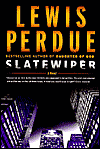Publisaurus Rex Versus Google
I suppose if you don't have any useful or innovative ideas of your own, a company like Google can be pretty frightening. So, if you don't have any original ideas, then you need to sue to kill those who DO have them.
As you're probably read by now, Google is being by the Authors Guild and the American Association of Publishers (AAP) for copyright infringement.
From all the misleading sturm, drang und hype coming from the plaintiffs, you'd think that Google was planning to out-pirate Johnny Depp by stealing every published word on the planet and posting it on a Kazaa or BitTorrent file-sharing service.
But ... no.
Google is being sued for having the good sense to scan books in order to make them searchable online much as Amazon has done. The books would then be available for purchase with appropriate payments to copyright holders.
Think back a little. When Amazon made books searchable, the industry freaked out, afraid of a new idea that had dropped from the sky like a Coke bottle in the African bush. I thought it was a good idea then and a better one now. My books are searchable on Amazon and, if anything, it has helped sales. I've used the Amazon searches for research and ended up buying books I would never have considered otherwise.
Google is just trying to do the same thing on a bigger basis. So why are the Authors Guild and the AAP really suing?
Well, fellow blogger, author and publisher John Battelle says it best:
"I have been both a publisher and an author, and I have to tell you, these guys sue for one reason and one reason alone, from what I can tell: Their legacy business model is imperiled, and they fear change. Of course, if they can get out of their own way, they'll end up making more money. But that never stopped these guys - the MPAA, the RIAA, and now, the AAP."
I have also been a publisher of books and periodicals and what I see here is a "dog in the manger" insecurity at work. The industry knows it's working with ideas that are SO last century, but persists in living in a state of denial rooted in literary arrogance.
In a Wall Street Journal OpEd piece, Cameron Stracher -- a writer and publisher of the New York Law School Law Review -- drew a solid conclusion when he wrote:
"[S]canning itself creates no revenue for Google and doesn't deprive copyright holders of income. It is only when a reader purchases a book that Google derives revenue.... Thus, its scanning ought to be protected by the "fair use" doctrine.
"Publishers....sound just like the music industry, which abdicated one of the greatest opportunities in tech history to the Napsters. Lawsuits can't stop innovation by bottling it up in court.... When corporate interests get in the way, the only people who are hurt are the public and the creators of that content. Authors may think they're protecting their rights; but they're protecting the rights of publishers to make another dime off their backs. Authors might even welcome such exploitation if publishers really had plans to make a dime (and pay them their 12% royalty). But history teaches us that you can't teach an old dinosaur new tricks."
With the exception of one or two publishing companies, I have a lot more faith in Google to advance my writing career that than I do in Publisaurus Rex.



2 Comments:
Well said.
I'm a Google fan. I Google for research at least ten times a day, I use Google email and I'll most likely use their service to buy books. It's funny - nobody sues the book stores for having books right out there in the open for just anybody to pick up and read for free. When will people learn that easy access to information allows more people to make more money?
Yeah, the Napster lesson has gone totally over the heads of publishers.
Post a Comment
<< Home